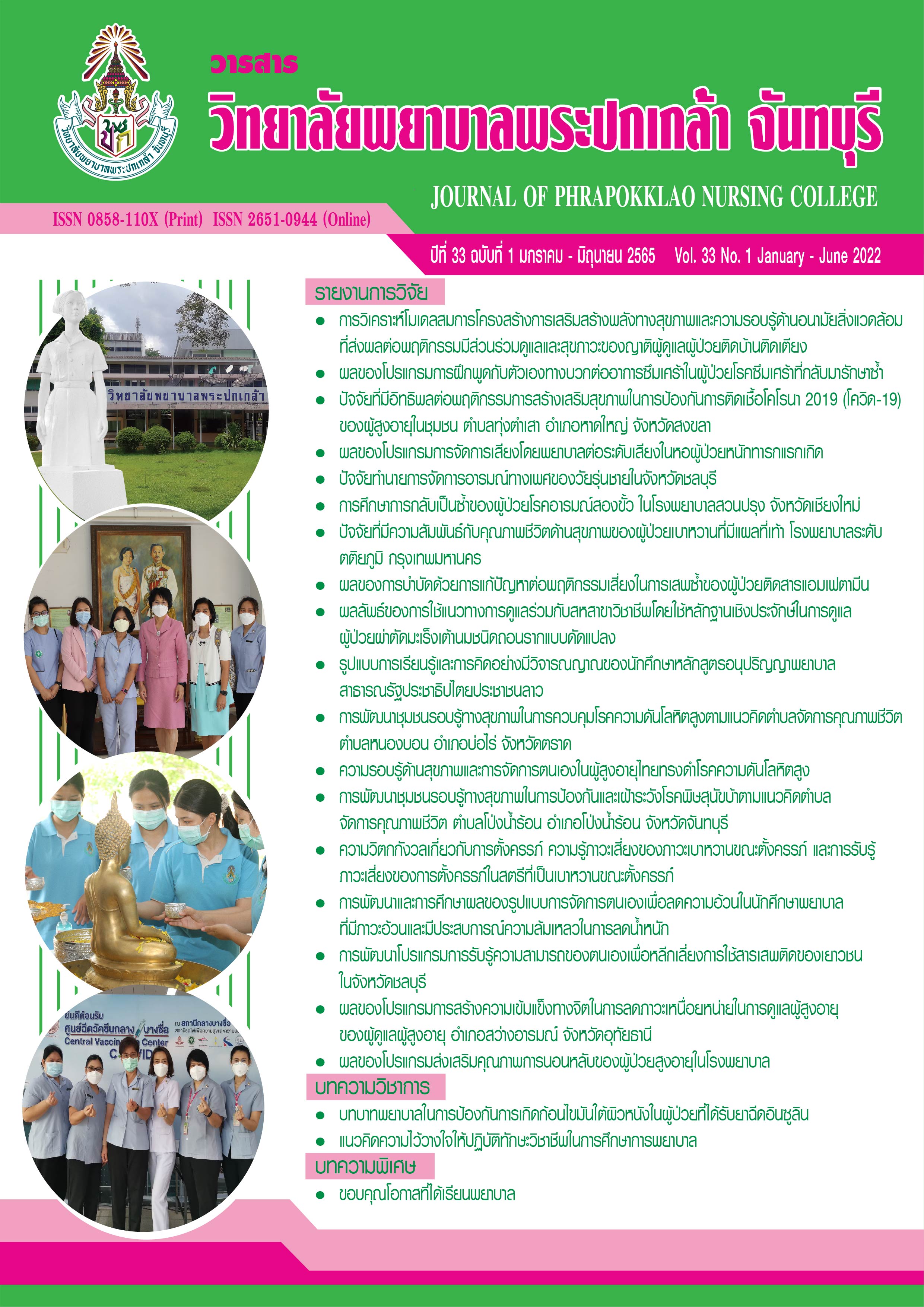Effect of the Positive Self-talk Training Program on Depressive Symptoms among Readmitted Patients with Major Depressive Disorder
Keywords:
Readmitted patients with major depressive disorder, Depressive symptoms, Positive self-talk training programAbstract
This quasi-experimental research aimed to examine the effect of the positive self-talk training program on depressive symptoms among readmitted patients with major depressive disorder. The participants included 52 readmitted patients with major depressive disorder who received treatment at the in-patient department, Suan Prung Psychiatric Hospital, Chiang Mai Province and were divided into the experimental group (n = 26) and the control group (n = 26). The research instruments consisted of the positive self-talk training program, the demographic questionnaire, and the 9-Item Thai Patient Health Questionnaire (Thai PHQ-9) with reliability as .86. The implementation and data collection were conducted from July, 2019 to January, 2020. Data were analyzed using frequency, percentage, paired t-test, and independent t-test.
The research results revealed that 1) after the experiment, the experimental group had statistically significantly lower mean score of depressive symptoms than that of before the experiment (t = 13.070, p < .001); and 2) after the experiment, the experimental group had statistically significantly lower mean score of depressive symptoms than that of the control group (t = 4.550, p < .001).
This research suggests that psychiatric nurses should apply this positive self-talk training program to care of readmitted patients with major depressive disorder in order to reduce their depressive symptoms.
References
กรมสุขภาพจิต. (2561). รายงานผู้ป่วยมารับบริการด้านจิตเวช ภาพรวมทั้งประเทศ ประจำปีงบประมาณ 2561. สืบค้นจาก https://www.dmh.go.th/report/datacenter/map/reds.asp
กรมสุขภาพจิต. (2562). โรคซึมเศร้า ความผิดปกติทางอารมณ์ที่รักษาให้หายได้. สืบค้นจาก https://www.dmh.go.th/news-dmh/view.asp?id=29902
ขวัญจิต มหากิตติคุณ. (2548). ผลของโปรแกรมการฝึกพูดกับตัวเองทางบวกต่อภาวะซึมเศร้าในเด็กวัยรุ่น (วิทยานิพนธ์ปริญญามหาบัณฑิต). มหาวิทยาลัยเชียงใหม่.
ธรณินทร์ กองสุข. (บ.ก.). (2550). โรคซึมเศร้า: องค์ความรู้จากการทบทวนหลักฐานทางวิชาการ. อุบลราชธานี: ศิริธรรมออฟเซ็ท.
นฐภัทร พิทักษ์. (2552). การวิเคราะห์สถานการณ์การดูแลผู้ป่วยโรคซึมเศร้าที่กลับมารักษาซ้ำ ในโรงพยาบาลสวนปรุง จังหวัดเชียงใหม่ (วิทยานิพนธ์ปริญญามหาบัณฑิต). มหาวิทยาลัยเชียงใหม่.
นันทิรา หงษ์ศรีสุวรรณ์. (2560). ภาวะซึมเศร้า Depression. สืบค้นจาก http://journal.hcu.ac.th/pdffile/jn1938
พรทิพา บุญหมื่น. (2559). ผลของโปรแกรมการฝึกพูดกับตัวเองทางบวกต่อภาวะซึมเศร้าในผู้ป่วยโรคติดสุรา โรงพยาบาลสวนปรุง จังหวัดเชียงใหม่ (วิทยานิพนธ์ปริญญามหาบัณฑิต). มหาวิทยาลัยเชียงใหม่.
มาโนช หล่อตระกูล, และปราโมทย์ สุคนิชย์. (บ.ก.). (2558). จิตเวชศาสตร์ รามาธิบดี (พิมพ์ครั้งที่ 4). กรุงเทพฯ: ภาควิชาจิตเวชศาสตร์ คณะแพทยศาสตร์โรงพยาบาลรามาธิบดี มหาวิทยาลัยมหิดล.
ราชาวดี เดี่ยวตระกูล. (2553). ผลของโปรแกรมการฝึกพูดกับตัวเองทางบวกต่อภาวะซึมเศร้าของผู้ป่วยโรคเรื้อรัง ในเขตสำนักงานสาธารณสุข อำเภอเมือง จังหวัดอุตรดิตถ์ (วิทยานิพนธ์ปริญญามหาบัณฑิต). มหาวิทยาลัยเชียงใหม่.
โรงพยาบาลสวนปรุง จังหวัดเชียงใหม่. (2560). จำนวนผู้ป่วยที่เข้ามารับการรักษาที่ รพ.สวนปรุง. สืบค้นจาก http://110.164.161.25:8080/ex_sp/ipdmain.aspx
ลลิตา อันอามาตย์, และชิงชัย เมธพัฒน์. (2557). การรับรู้ภาวะสุขภาพและพฤติกรรมการดูแลตนเองของผู้ป่วยโรคซึมเศร้าที่กลับเป็นซํ้า. วารสารสุขภาพจิตชุมชนแห่งประเทศไทย, 1(2), 11–20.
สมโภชน์ เอี่ยมสุภาษิต. (2549). ทฤษฎีและเทคนิคการปรับพฤติกรรม (พิมพ์ครั้งที่ 5 ฉบับปรับปรุง). กรุงเทพฯ: สำนักพิมพ์แห่งจุฬาลงกรณ์มหาวิทยาลัย.
สุวรรณา อรุณพงค์ไพศาล, และสรยุทธ วาสิกนานนท์. (บ.ก.). (2558). ตำราโรคซึมเศร้า. ขอนแก่น: โรงพิมพ์คลังนานาวิทยา.
Beck, A. T. (1970). Depression: Causes and treatment. Philadelphia, PA: University of Pennsylvania Press.
Beck, A. T. (2008). Cognitive and behavioral theories of depression. New York: International Universities Press.
Beck, J. S. (1995). Cognitive therapy: Basics and beyond. New York: Guilford Press.
Cohen, J. (1988). Power tables for effect sized. Retrieved from http://psych.unl.edu/hoffman/Sheets/Workshops/Power_Tables.pdf
Lotrakul, M., Sumrithe, S., & Saipanish, R. (2008). Reliability and validity of the Thai version of the PHQ-9. BMC Psychiatry, 8, 46. doi:10.1186/1471-244X-8-46
Nelson-Jones, R. (1990). Thinking skill: Managing preventing personal problem. Pacific Grove, CA: Brooks Cole Publishing.
World Health Organization. (2017). Depression. Retrieved from http://www.who.int/mediacentre/factsheets/fs369/en/
Wright, P., Stern, J., & Phelan, M. (2005). Core psychiatry (2nd ed.). Spain: Harcourt.
Downloads
Published
How to Cite
Issue
Section
License
Copyright (c) 2022 JOURNAL OF PHRAPOKKLAO NURSING COLLEGE

This work is licensed under a Creative Commons Attribution-NonCommercial-NoDerivatives 4.0 International License.
เนื้อความ ข้อมูล และรายการอ้างอิงที่ผู้เขียนใช้ในการเขียนบทความเพื่อลงตีพิมพ์ในวารสารวิทยาลัยพยาบาลพระปกเกล้า จันทบุรี ถือเป็นความคิดเห็นและความรับผิดชอบของผู้เขียน คณะผู้จัดทำวารสารไม่จำเป็นต้องเห็นพ้องด้วยหรือร่วมรับผิดชอบ
บทความที่ได้รับการลงตีพิมพ์ในวารสารวิทยาลัยพยาบาลพระปกเกล้า จันทบุรี ถือเป็นลิขสิทธิ์ของวารสารวิทยาลัยพยาบาลพระปกเกล้า จันทบุรี หากหน่วยงานหรือบุคคลใดต้องการนำส่วนหนึ่งหรือทั้งหมดของบทความไปเผยแพร่ต่อเพื่อวัตถุประสงค์ใด ๆ จะต้องได้รับอนุญาตจากบรรณาธิการวารสารก่อน



